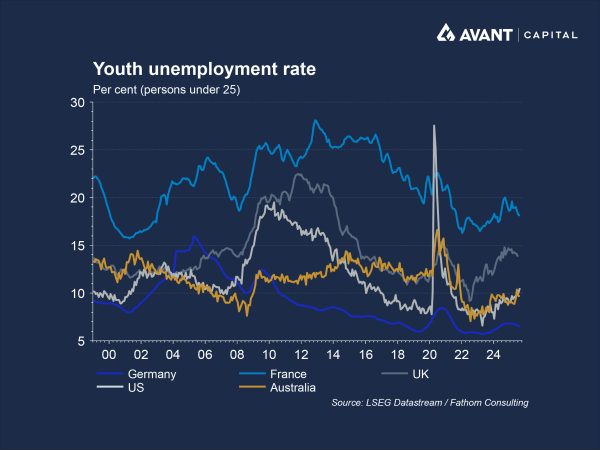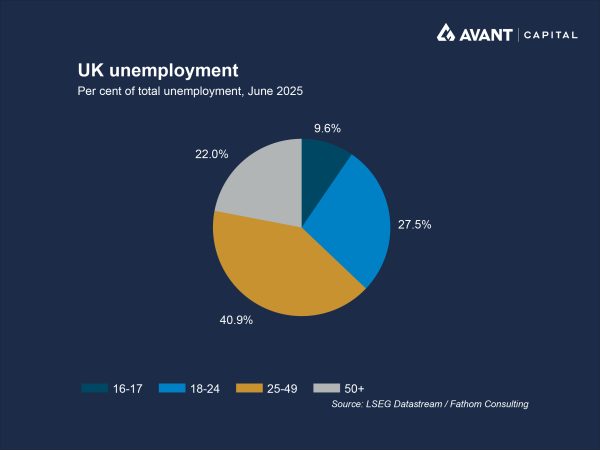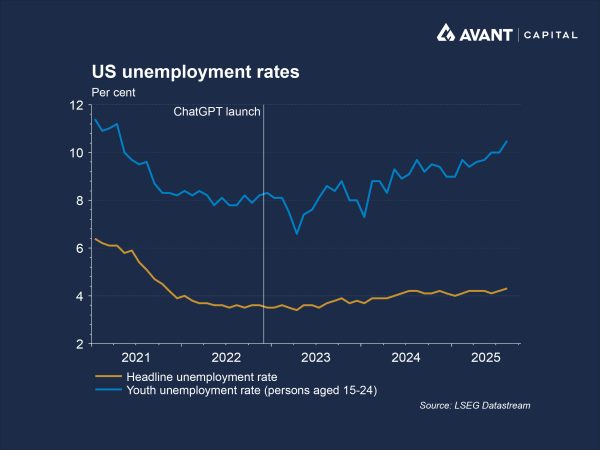Are graduates struggling to find jobs?
Across advanced economies, recent graduates are facing one of the toughest job markets in decades. Despite holding degrees in fields ranging from finance to engineering, many are submitting applications with little success.

In the UK, the proportion of final-year students securing jobs before graduation dropped to 27% in 2025, the lowest since the pandemic year of 20211. Unemployment for those aged 17-24 also now accounts for 37.1% of total unemployment.

In the US, unemployment among those under 25 rose to 10.5% in August 2025, its highest since the pandemic and above the broader August 2025 unemployment rate of 4.3%.

What role is AI playing?
AI is increasingly cited as a disruptive force in entry-level hiring. Tools like ChatGPT and other generative AI models are now capable of performing many of the tasks traditionally assigned to junior staff – data entry, research, basic coding, and drafting reports. This has led some companies to reduce or eliminate entry-level roles altogether, as they instead automate tasks. AI is also reshaping the expectations for new hires, rather than just replacing tasks. Employers now seek graduates who can work alongside AI tools, validate outputs, and develop AI agents. The bar for entry-level roles is therefore rising, with companies expecting new hires to be AI-literate and capable of critical thinking from day one.
What does this mean for the broader labour market?
The graduate employment crisis may be a leading indicator of deeper structural changes in the labour market. Entry-level hiring is often the first to be cut during downturns, and its decline can foreshadow broader employment issues. This is particularly relevant as companies ramp up investment in AI. The Magnificent Seven tech stocks – Apple, Microsoft, Alphabet, Amazon, Meta, Nvidia, and Tesla – have collectively invested hundreds of billions of dollars in AI infrastructure and are projected to spend an additional US$385 billion in 20252. These firms are not merely experimenting with AI; they are anticipating substantial returns on their investments. This expectation is driving pressure to deliver productivity gains, which could involve workforce reductions. In tech, the share of entry-level hires at major firms fell by 50% between 2019 and 2024, suggesting that this drive for efficiency is already becoming visible in hiring data3.
The future of employment therefore remains highly uncertain, but will no doubt see employees expected to develop strong proficiency with AI tools. At the same time, companies may begin reducing headcounts, as they pursue productivity gains from their AI investments.
References
- Financial Times, “It’s been a terrible year to graduate and find a job,” 30 August 2025
- GO Markets, “The Magnificent Seven’s $385 billion AI war,” 22 August 2025
- The Wall Street Journal, “AI is wrecking an already fragile job market for college graduates,” 29 July 2025
